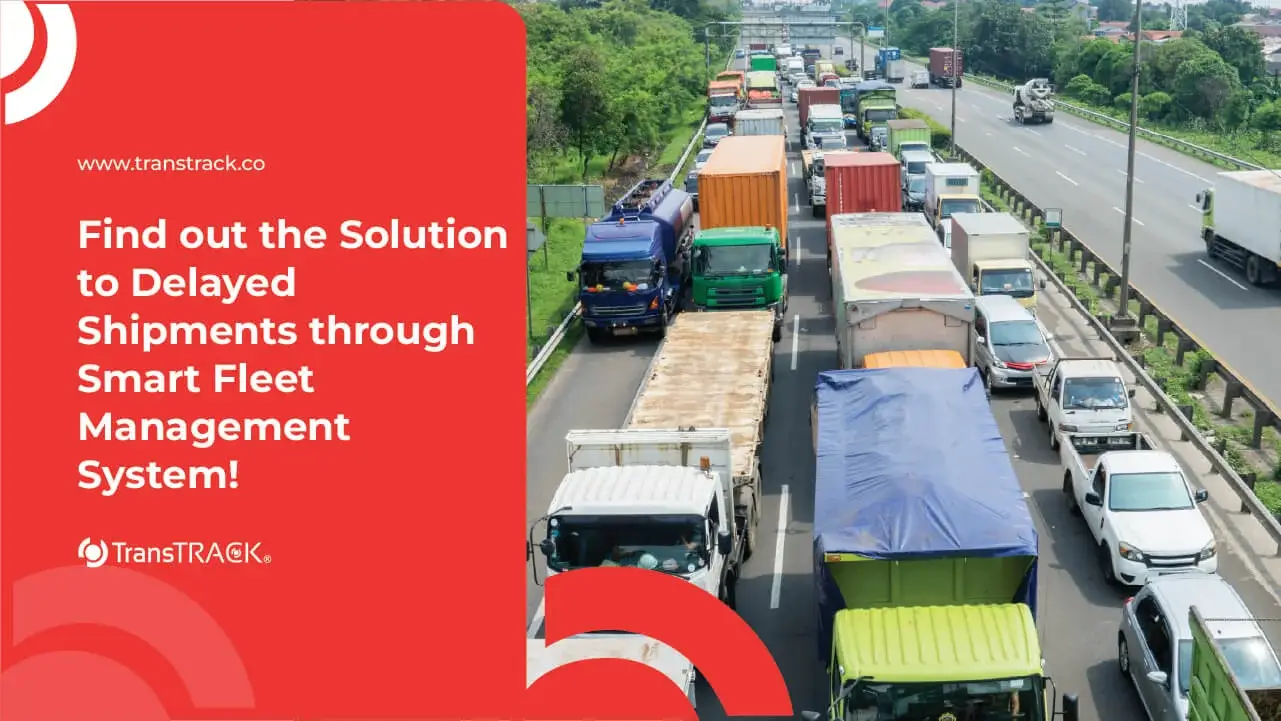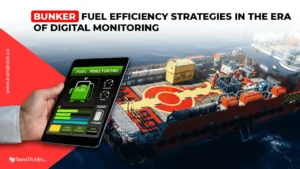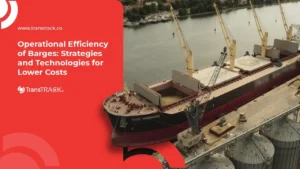Find out the Solution to Delayed Shipments through Smart Fleet Management System!
Posted on May 6, 2025 by Nur Wachda Mihmidati

In the logistics industry, timeliness is everything. However, in reality, many companies still face challenges such as inefficient delivery routes, lack of fleet visibility, and slow communication when problems occur. As a result, delivery delays become a recurring problem that has a direct impact on reputation and customer loyalty.
To meet these challenges, businesses need a more modern and integrated approach-not just more fleets or personnel. <It’s time to turn to technology-based solutions that can provide complete control over every aspect of shipping.
One of the most effective solutions is to adopt Transportation Management System (TMS) from TransTRACK, a system designed to bring efficiency, transparency, and speed to every shipping process.
What are the Causes of Delayed Shipments?
In the world of logistics and distribution, delivery timeliness is one of the crucial factors that affect customer satisfaction and operational efficiency. However, in practice, delivery delays are often unavoidable due to various factors, both technical and non-technical.
Understanding the causes of these delays is very important so that companies can take the right preventive and corrective steps. Here are some common causes of late delivery:
1. Weather and Road Conditions
Extreme weather such as heavy rain, floods, storms, or thick fog can disrupt vehicle travel. In addition, poor road conditions, such as potholes, severe traffic jams, or roads that are being repaired, also slow down delivery travel time.
2. Data Input or Delivery Address Errors
Errors in data entry such as the recipient’s name, phone number, or incomplete/incorrect address can lead to items getting lost, returned, or having to be resent. This not only hampers the delivery process but also increases operational costs.
3. Fleet Management Constraints
Suboptimal fleet management-such as a limited number of vehicles, inefficient delivery schedules, or selection of vehicles that do not match the type of cargo-can lead to delivery queues and distribution delays.
4. Slow Administrative and Customs Processes
For shipments across countries or regions, complicated administrative processes and customs regulations can be a significant obstacle. Especially if there are document errors or regulatory discrepancies, goods can be held longer at checkpoints.
5. Lack of Real-Time Tracking System
Without a real-time tracking system, companies struggle to accurately monitor the position of goods. This makes it difficult to identify potential delays early and provide accurate information to customers.
The Impact of Delivery Delays on Business
Delivery delays are not just a logistical issue-the impact can spread to various important aspects of business operations and sustainability. The more frequent delays occur, the greater the risk of losses that must be borne by the company, both in the short and long term.
Here are some of the main impacts to watch out for:
1. Decreased Customer Satisfaction and Loyalty
Customers expect timely and promised deliveries. When goods arrive late, customer trust and satisfaction are immediately affected. If this happens repeatedly, customer loyalty will decline and they may switch to competitors who provide more reliable services.
2. Financial and Brand Reputation Losses
Delayed deliveries can lead to additional costs such as compensation, returns, or penalties from business partners. In addition, a negative perception of the brand will be formed, especially if customer complaints spread through social media or online reviews. Rebuilding a tarnished reputation is no easy feat.
3. Supply Chain Disruption
The delay of a single shipment can trigger a domino effect in the supply chain-for example, a delay in raw materials will hamper the production process, which then disrupts distribution to end customers. This is especially costly for businesses that rely on just-in-time systems or have tight production cycles.
Operational Late Delivery Solutions
To effectively address delivery delays, companies need to take a holistic approach, not just relying on adding fleets or manpower. A systematic and data-driven operational strategy is needed to make deliveries more efficient, responsive and monitorable in real-time.
Here are some operational solutions that can be implemented:
1. Optimization of Delivery Route Planning
By designing efficient delivery routes based on traffic data, mileage, and delivery priority, companies can reduce travel time and the risk of delays. The use of automatic routing algorithms in the TMS system is helpful to achieve this efficiency.
2. Real-Time Fleet Monitoring with GPS
Real-time vehicle tracking allows the operations team to know the position of the fleet, estimate the time of arrival, and respond quickly in case of any disruptions on the way. With integrated GPS technology, visibility into delivery activities becomes much more transparent and accurate.
3. Integration of Logistics and TMS (Transportation Management System – TransTRACK)
Integrating all logistics processes into one platform such as TransTRACK TMS allows planning, scheduling, tracking, and reporting to be done automatically and centrally. This reduces the risk of human error, improves operational efficiency, and speeds up decision-making.
4. Logistics Staff Training for Proper SOPs
Operational staff who are familiar with standard operating procedures (SOPs) can handle obstacles in the field quickly and efficiently. Regular training also helps them keep up with the latest technology and policies in logistics.
5. Proactive Communication with Customers when Delays Occur
When delays are inevitable, it is important to maintain customer trust by providing clear and prompt information. Proactive communication-through automated notifications or customer service-can reduce potential complaints and maintain a professional image.
Implementing the above solutions not only reduces delays, but also increases productivity and overall customer satisfaction.
Technology to Use for Shipment Tracking
In the digital era, technology plays a crucial role in ensuring smooth, transparent, and timely delivery of goods. Various smart systems now allow logistics companies to monitor the position, condition, and estimated arrival of goods in real-time, while making faster and more accurate decisions.
Here are the main technologies that can be used for shipment tracking:
1. Fleet Management System
This system allows companies to centrally manage vehicle fleets, including departure schedules, routes traveled, fuel consumption, and driver behavior. With efficient fleet management, potential delays can be significantly reduced.
TransTRACK Fleet Management System is equipped with a tracking dashboard, automatic alerts, and integration with other operational systems.
2. Live Container and Goods Tracking System
Through GPS and special tracking devices, the position of containers and goods can be monitored live during the shipping process. Customers and logistics service providers can see the estimated time of arrival and status of goods at any time.
This feature is very important for cross-regional or international shipments, especially in the export-import sector and port logistics.
3. IoT Sensors for Monitoring Shipping Conditions
IoT (Internet of Things) based sensors enable monitoring of the physical condition of goods during transit, such as:
- Temperature (important for food, medicine, vaccines)
- Humidity
- Vibration/shake
- Container door opening
If an anomaly occurs, the system will automatically send an alert to the control center.
4. AI for ETA Prediction and Delay Estimation
Artificial intelligence technology is capable of analyzing historical data and real-time traffic conditions to accurately predict time to arrival (ETA). In addition, AI can also provide early notification of potential delays based on detected patterns and risks.
This technology helps logistics teams make proactive decisions, such as rerouting or adjusting delivery schedules.
By combining the four technologies above, companies can build a logistics system that is transparent, efficient, and adaptive to field challenges.

Optimize Delivery, Minimize Delays
Delivery delays aren’t just a technical challenge-they’re a direct threat to customer satisfaction, operational efficiency, and your business reputation. It requires a solution that is not only reactive, but also proactive, integrated, and technology-based.
With Transportation Management System from TransTRACK, you can:
- Plan delivery routes and schedules automatically and efficiently
- Monitor fleet and goods status in real-time
- Manage the entire logistics process from one unified dashboard
- Predict ETAs and risk of delays with AI support
- Provide maximum transparency to internal teams and customers
Don’t let delays stand in the way of your business growth.
It’s time to switch to a modern shipping system with TransTRACK TMS-a complete solution for full control over your shipments.
Contact the TransTRACK team now for a free demo or TMS implementation consultation that suits your business needs.
Topic :
 Bahasa Indonesia
Bahasa Indonesia









